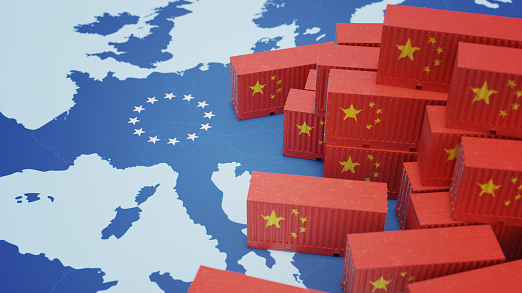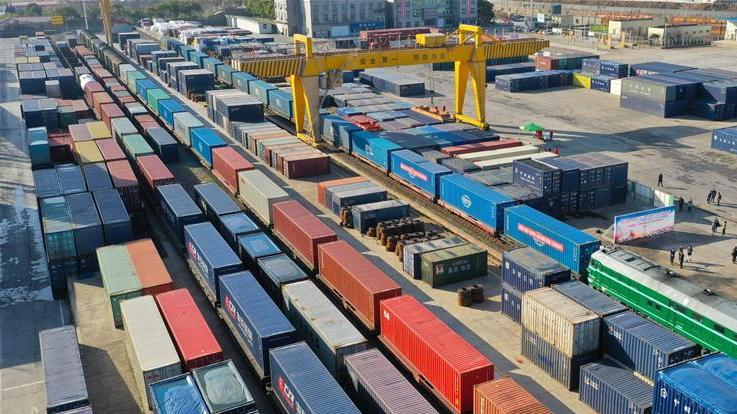
Editor's note: Azhar Azam works in a private organization as market and business analyst and writes about geopolitical issues and regional conflicts. The article reflects the author's opinions and not necessarily the views of CGTN.
Through the China-European Union (EU) Comprehensive Agreement on Investment (CAI) in December, European investors gained unprecedented access to one of the world's biggest and fastest-growing markets, China. At the conclusion of negotiations, the bloc said that for the first time Beijing had agreed to ambitious provisions with a trade partner.
Yet, in a disappointing move, the EU parliament voted to freeze the ratification of the milestone and symbiotic investment deal on May 20 until Beijing lifts sanctions, imposed as a rational reaction to Europe's restrictions on Chinese individuals, from European individuals and entities.
With Brussels believing that improved business ties with Beijing will boost the EU economic growth as the Union has invested heavily in China's automotive, basic materials, and other sectors – Chinese commitment to a rules-based relationship was seen as a positive signal for the world economy, facing varied complex challenges from raging pandemic to surging protectionism, by European experts.
The deferral in the approval dealt a blow to tiring negotiations of 35 rounds in seven years and adversely affected Chinese and European companies, expected to benefit from wider investment access and better protection in each other's markets. It additionally put the bloc's push to create jobs in the EU where unemployment rose by more than two million to 15.52 million in March 2021 as compared to March 2020.
Still, some positive comments and factors – as the EU seeks to avert escalation and wants to continue engagement with China, has ruled out the perception of the stalled investment deal, treats Beijing as a "negotiating partner for cooperation," and is fostering cooperation on other areas such as climate change – buoy up hopes that China and the EU can prevent their relationship from a downward spiral.
Brussels' key priorities have been speedy recovery from the pandemic, rebuilding the economy, and becoming an influential global player and world leader in climate change. While interests of China and the EU converge on all these issues and the latter recognizes it needs to do a lot to develop it into an effective geopolitical actor, Brussels should look to steel business and trade ties and keep all communication lines open with Beijing.
Very well aware of their deeply entwined economies, Beijing and Brussels have magnified their bilateral trade by 42 percent besides pouring 12.4 percent and 70.8 percent more investments in reciprocal markets respectively during the first four months of 2021. This clearly indicates that both sides were realizing the importance of upgrading the cooperation and strengthening their relationship.

A China-Europe freight train waiting for departure at Xiangtang railway port in Nanchang, east China's Jiangxi Province, February 17, 2020. /Xinhua
A China-Europe freight train waiting for departure at Xiangtang railway port in Nanchang, east China's Jiangxi Province, February 17, 2020. /Xinhua
Europe's goal number one is to achieve "strategic autonomy," lessen increasing reliance and dependence on external forces, mainly the United States. The policy concept – which has now widened from consolidation of European defense and security to an economic and technology independence and production in processors, manufacturing vital medicines and other essential products – needs China, which is establishing itself as a pioneer in technological advancement and digitalization, to uplift region's shrinking economic competitiveness and avoid global insignificance.
Unlike the UK departure from the EU, the U.S. "America First" policy or the COVID-19 test that threatens Europe's pursuit of the "new common project" – China's economic rise and strong industrial demand offer an opportunity for the Union. Chinese academics, think tanks, and leadership have voiced support for Europe's ambition and continue showing a willingness to expand cooperation in all areas including climate change, global governance, and multilateralism.
Last year, Europe's economy contracted by 6.3 percent, the worst in the bloc's history with infection killing hundreds of thousands in a region of 450 million and taking an economic toll on millions of others. As Brussels fast-tracks the vaccination drive and inoculates European people, it isn't wise to disrupt the looming economic rebound by holding progress on the CAI.
China is the EU's largest trading partner and Brussels is Beijing's second-biggest. According to the International Monetary Fund's April 2021 World Economic Outlook, China and the EU-19 accounted for more than 30 percent of the global economy in 2020. It is important for Brussels to boost momentum for the projected financial upturn by reinforcing economic and trade relations with Beijing and making full use of the opportunity unleashed to the political coalition in the form of the investment deal.
Notwithstanding European parliamentary forebodings, the European Commission thinks the deal is right and felicitous for the bloc. France and Germany, key backers of the pact, too are unlikely to change their support on their economic utility with Beijing even if the government changes after the upcoming elections in the two European economic heavyweights.
Federica Mogherini, former foreign policy chief of the EU, says that Europe understands dialogue and cooperation in a respectful manner are better than confrontation. She observes "the European Union is genetically programmed to support multilateralism." It's the same practice being strongly advocated and pursued by China to tackle global challenges through consultations in multilateral institutions such as the United Nations.
Both China and the EU are great economic powers and strategic partners, which in many ways are interdependent and have several shared interests. Neither has the leverage nor should they force the other side to change its domestic policies. The CAI is a favor to none, but to the economies and people of these two valuable markets so progress must be made on the deal that would help Europe pull off its pre-pandemic economic growth and "strategic autonomy."
(If you want to contribute and have specific expertise, please contact us at opinions@cgtn.com.)

